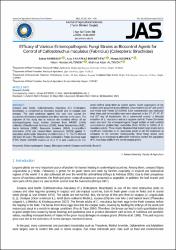Efficacy of various entomopathogenic fungi strains as biocontrol agents for control of callosobruchus maculatus (Fabricius) (coleoptera: Bruchidae)

View/
Date
2021Author
Kordalı, ŞabanUsanmaz Bozhüyük, Ayşe
Kesdek, Memiş
Altınok, Hacer Handan
Altınok, Mahmut Alper
Metadata
Show full item recordCitation
Kordalı, Ş. , Usanmaz Bozhüyük, A. , Kesdek, M. , Altınok, H. & Altınok, M. A. (2021). Efficacy of Various Entomopathogenic Fungi Strains as Biocontrol Agents for Control of Callosobruchus maculatus (Fabricius) (Coleoptera: Bruchidae) . Journal of Agricultural Sciences , 27 (4) , 454-459 . DOI: 10.15832/ankutbd.702271Abstract
Cowpea seed beetle, Callosobruchus maculatus (F.) (Coleoptera: Bruchidae), is considered an important bruchid pest in cowpea seed storages. The used pesticides against this pest have caused the occurrence of resistant populations and direct toxicity to the users. The objective of this study was to evaluate the mortality effects of six entomopathogenic fungi isolates obtained from ARSEF (USA) collection [Paecilomyces farinosus (2538), Isaria fumosorosea (4501), Isaria farinosa (3580), Beauveria bassiana (4984), Lecanicillium muscarium (972) and Lecanicillium muscarium (5128)] against C. maculatus adults under laboratory conditions (26±2 °C, 70±5% RH and 16h light: 8h dark). The isolates were cultivated in Potato Dextrose Agar (PDA, Oxoid, CM0139) medium at 26±2 ºC in dark conditions for two weeks before using them as control agents. Spore suspensions of the isolates were prepared at two different concentrations (1x105 and 1x107)and mixed with Tween 20 (0.04%). Each concentration was replicated three times and the mortality rates were observed on the 2nd, 4th, 6th, 8th and 10th day of incubations. As a commercial control, a Mycotal extraction of L. muscarium and as a negative control, Tween 20+sterile water was used. Six entomopathogenic fungal isolates at both conidial concentrations yielded high mortalities (from 62.6% to 100%) of C. maculatus adults. These results illustrated that tested fungi strains led to significant mortalities on C. maculatus adults in all the treatments as compared to the controls. Consequently, these fungi strains were regarded as an encouraging alternative method to control the population of C. maculatus adults in the stored cowpea grains.

















